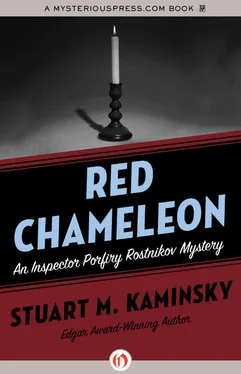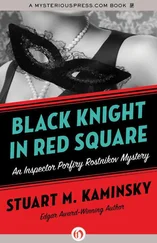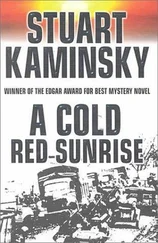Stuart Kaminsky - Red Chameleon
Здесь есть возможность читать онлайн «Stuart Kaminsky - Red Chameleon» весь текст электронной книги совершенно бесплатно (целиком полную версию без сокращений). В некоторых случаях можно слушать аудио, скачать через торрент в формате fb2 и присутствует краткое содержание. Год выпуска: 2012, ISBN: 2012, Издательство: MysteriousPress.com/Open Road, Жанр: Полицейский детектив, на английском языке. Описание произведения, (предисловие) а так же отзывы посетителей доступны на портале библиотеки ЛибКат.
- Название:Red Chameleon
- Автор:
- Издательство:MysteriousPress.com/Open Road
- Жанр:
- Год:2012
- ISBN:978-1-4532-6632-8
- Рейтинг книги:4 / 5. Голосов: 1
-
Избранное:Добавить в избранное
- Отзывы:
-
Ваша оценка:
- 80
- 1
- 2
- 3
- 4
- 5
Red Chameleon: краткое содержание, описание и аннотация
Предлагаем к чтению аннотацию, описание, краткое содержание или предисловие (зависит от того, что написал сам автор книги «Red Chameleon»). Если вы не нашли необходимую информацию о книге — напишите в комментариях, мы постараемся отыскать её.
Red Chameleon — читать онлайн бесплатно полную книгу (весь текст) целиком
Ниже представлен текст книги, разбитый по страницам. Система сохранения места последней прочитанной страницы, позволяет с удобством читать онлайн бесплатно книгу «Red Chameleon», без необходимости каждый раз заново искать на чём Вы остановились. Поставьте закладку, и сможете в любой момент перейти на страницу, на которой закончили чтение.
Интервал:
Закладка:
Karpo said nothing when the car pulled up in front of the building. He got in the back and cradled his senseless arm. His eyes caught those of the driver watching him in the rearview mirror, and Karpo stared back at the mirror, unblinking. He kept his dark eyes fixed on the mirror for five full minutes, so that each time the driver looked up, he saw his pale passenger solemnly glaring through him. The driver sped onward, wanting to get this assignment done as soon as possible and vowing never to get on the wrong side of the dispatcher again.
Luck had been with Karpo, though he did not think of it as luck. It simply happened. Had he not spotted the museum guard in the crowd on Kropotkin Street, he would have gone to the museum, waited for the guard’s call, and eventually have caught up with the woman. But Karpo saw her, dark and heavy, carrying the case, walking like a somnambulist, her lips moving as she carried on a conversation with herself.
“Corner, stop,” Karpo said, and the driver gladly pulled over with a screech, almost running down a couple with a small child between them. “Go back,” Karpo said, and got out of the car. The car was gone before the pale policeman reached the sidewalk.
The uniformed guard was startled when Karpo tapped his shoulder. He let out a gasp, turned in fear, and recognized the. assistant inspector. The guard was about fifty, his tie stained with sweat.
“She’s-” he began.
“I see,” Karpo said softly, watching the woman amble ahead, clearing a path with her trombone case. “Go back to the museum.”
“I’ll go back to the museum,” the guard repeated, and Karpo moved past him through the crowd as the first drops of rain came from the dark, angry sky.
SEVEN
“And so I had officer Zelach follow Assistant Inspector Tkach as a backup,” Rostnikov explained as he sat in the chair in front of Deputy Procurator Khabolov’s desk. “When Tkach took more than twenty minutes inside the building, Zelach followed instructions and called me. I-”
“My car,” Khabolov said, standing suddenly behind the desk, his sad hound face quivering, his hands held behind his back to keep them from spasms of anger and frustration.
The office smelled slightly bitter, like the waiting room of a steam bath. When Anna Timofeyeva had occupied it, the office had always smelled to Rostnikov of tea and paper.
“Your car-” Rostnikov sighed, sympathetically shifting slightly to take some pressure from his leg. “Tkach and I risked our lives to save your Chaika, our very lives, but there was no dealing with the madwoman.”
Khabolov’s hand came out to accuse or attack, but he controlled it and raised the palm to push the stray hairs atop his head. The battle was joined and clear. Rostnikov would feign sympathy, and Khabolov would know he was lying but be unable to accuse him. Khabolov would pick, question, punish, but not allow his emotions to show, not let it be seen that he was punishing, though he knew that Rostnikov would understand. And so the two men faced each other and pretended.
“I appreciate your willingness to risk your very bodies for material goods,” Khabolov countered, returning his hand behind his back.
“I felt that the deputy procurator’s official vehicle was more a symbol of the authority of the state than an item of personal and material satisfaction,” said Rostnikov, somberly folding his hands on his lap.
Khabolov looked down at Rostnikov, searching for even a hint of insolence, but there was none there. The deputy procurator’s eyes moved down to the report on his desk. He had to lean forward slightly to read it.
“You were unable to save my automobile, but you managed to break the shoulder of one suspect, the ribs of another, and the skull of a third.”
“They resisted arrest.”
“Do you expect the government to pay for repairs on your suit?”
Rostnikov looked down at this torn sleeve. He had been given no time to change clothes; instead, he had hurried back to Petrovka to write his report and get to the deputy procurator’s office.
“Of course not,” Rostnikov said. “It was, like your Chaika, ruined in the line of duty, but we must all make sacrifices for the state and accept our share of responsibility.”
“You are an insolent man, chief inspector,” Khabolov said, leaning forward with both hands on the desk.
“I am a weary man, comrade procurator, and I have a sniper and the killer of an old man to pursue. May I be excused?”
Khabolov’s face flushed and turned red, though not quite as red as the flag that stood in the corner. His eyes went narrow, and Rostnikov recognized an official look designed to send fear into the guilty and. nonguilty alike. Rostnikov was too weary to feign fear. He simply looked up placidly. The excitement of the morning had passed. The body fluids had coursed through Rostnikov in that makeshift garage. It had been no more than ten minutes, perhaps less, but it was such minutes that made being a policeman most enjoyable. Generally, so little was actually concluded, and that which was concluded normally came to pass through patience and paper and telephone calls and long hours of talking and compromise. Porfiry Petrovich felt tired and pleased. Even with his eyes open and fixed attentively on Khabolov, he imagined the falling Chaika and smiled deep within himself.
“You may not be excused,” Khabolov said, sitting behind his desk to indicate a new phase of conversation. There was a heartbeat of hesitation in the dog-faced man that drew Rostnikov’s interest.
“Chief inspector, you are to drop your investigation of the murdered Jew completely and concentrate on the Weeper.”
“Very good,” Rostnikov agreed. “I’ll put it aside till the Weeper is caught and then-”
“You are to turn your files on the case over to me and drop the investigation completely and indefinitely-no, forever,” Khabolov cut in with irritation.
“On my own time I would like to check the procurator’s files for a-”
Khabolov was now perspiring, though the window was open, sending in a slight but adequate breeze. Something quite odd was going on, and Rostnikov began to observe his superior with curiosity.
“You no longer have access to the procurator’s files,” Khabolov said, reaching for a random file to indicate that the meeting had ended. With eyes down at the paper in his hand, he added, “For political reasons, which you may know.”
There was no arguing with Khabolov. Rostnikov knew this. It wasn’t that Khabolov couldn’t be maneuvered, swayed, tricked. Given time, Rostnikov was sure he would solve the man, find ways to deal with him, but the abrupt air of the man, coupled with his clear nervousness, made it evident that the order to drop the investigation came from somewhere above Khabolov.
And so Rostnikov barely nodded.
“That is all,” said Khabolov without looking up, and Rostnikov stood, propping himself up with the back of the chair, and moved slowly to the door and out. He had things to do, his jacket to change, and the murderer of Sergeant Petrov to catch. Perhaps the murder of Abraham Savitskaya and the mystery of the missing candlestick could wait. Perhaps.
By the time he got back to his tiny office, the rain had begun to fall. The single small window wouldn’t open; it hadn’t opened for months. Rostnikov had intended to fix it himself, though such initiative was frowned upon. There were repairmen assigned to such things, though the repairmen seldom came even after the proper forms were filed, approved, and forwarded. To get the window repaired through proper channels, Rostnikov would need the signature of Deputy Procurator Khabolov, and the price for such … Sitting behind his desk, Rostnikov smiled privately. A plan came. He watched the rain hit the window for about five minutes, doodled three-dimensional cubes of various sizes for a few more minutes, and scrawled out the work” order to have the window fixed.
Читать дальшеИнтервал:
Закладка:
Похожие книги на «Red Chameleon»
Представляем Вашему вниманию похожие книги на «Red Chameleon» списком для выбора. Мы отобрали схожую по названию и смыслу литературу в надежде предоставить читателям больше вариантов отыскать новые, интересные, ещё непрочитанные произведения.
Обсуждение, отзывы о книге «Red Chameleon» и просто собственные мнения читателей. Оставьте ваши комментарии, напишите, что Вы думаете о произведении, его смысле или главных героях. Укажите что конкретно понравилось, а что нет, и почему Вы так считаете.












